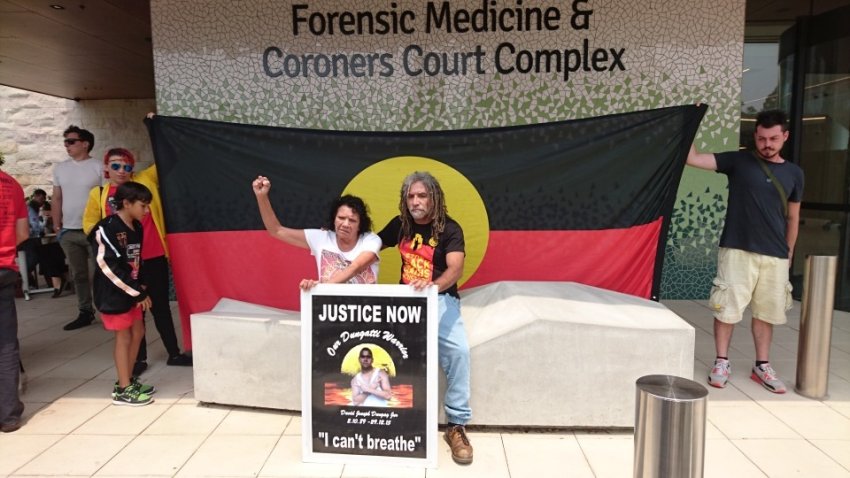
Deputy State Coroner Derek Lee found on November 22 that no one was to blame for the death of Dungatti man David Dungay Jnr, who died in the Long Bay Prison Hospital in 2015, and recommended no charges or sanctions against the prison officers involved in his death.
Cries of pain erupted as the findings were read out to a room packed with family and supporters. It took almost 4 years for the Coroners Court to deliver its findings. Dungay’s indefatigable mother Leetona, the Dungay family, activists from Fighting in Resistance Equally (FIRE) and Indigenous Social Justice Association (ISJA), and community members say justice has not been delivered.
Dungay was 26 years old when he died. In an attempted cell transfer, Dungay, a diabetic, refused to stop eating a packet of biscuits. As a result, six guards held him down, in a prone position, administering a sedative while nursing staff and four other guards looked on.
Dungay called out 12 times that he could not breathe and repeatedly begged for his life before losing consciousness. Several minutes passed before basic support was attempted. Still, the guards only attempted two compressions. David had an irreversible cardiac arrest.
The deputy coroner said he would not be attributing blame to organisations or individuals. While he recommended Nurse Xu be placed under review, he did not say the same for any police officers.
The report recommended some retraining for nurses, doctors and officers and for procedures and protocols and checklists to be examined. It also recommended Aboriginal inmates and officers be given training in how to de-escalate.
Dungay’s nephew Paul Francis said: “No justice has been done. The nurse got thrown under the bus while the officers who held my uncle down got off.
“We call on the Department of Public Prosecution to charge the officers. We are not going to be silent.”
Aunty Madeline MacGrady told Green Left Weekly that the killings had to stop: “When are they going to stop killing our kids? We are so tired.
“We might have had a little window. Today, we walk out again disappointed.
“We can’t give it up. Our focus is on our kids. We have to protect them from police and guards.
“Since the 1980s, they keep making recommendations. So we have to give up these kids for these people to be trained.
“Stop the arrests of our mob under the intoxication act. They did that with John Pat and Tanya Day and Rebecca Maher. They are still doing this.”
Coroners, like judges, are appointed by the state governor, who is appointed by the premier.
NSW State Coroner Teresa O’Sullivan, who was appointed on July 1, identified Indigenous deaths in custody as a “key issue” for the Coroner’s Court. This raised expectations among the Dungay family, as well as other families seeking justice for relatives who died in custody.
But the findings of the inquest in Dungay’s death show the coronial court system has not changed.
According to ISJA spokesperson Ken Canning: “In 231 years of occupation, not one prison or police officer has been found guilty of the death of an Aboriginal person”.
Despite Dungay’s case receiving an unprecedented amount of media attention as a result of a strong campaign led by his family and supporters, justice has not been delivered.
The campaign will now turn its attention to challenging the Coroners Court, Long Bay prison management and the NSW Coalition government.
ISJA spokesperson Raul Bassi said: “We will continue to fight for justice. ISJA has no confidence in coronial inquiries.”